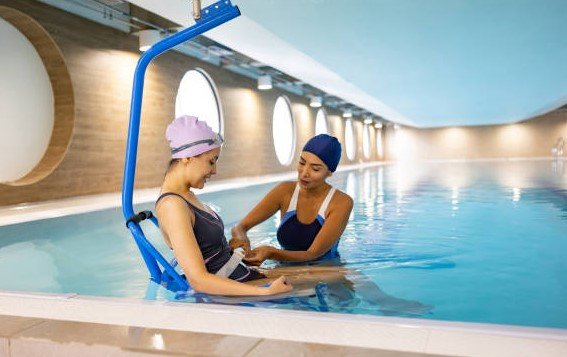Glasgow is stepping up efforts to make sports more accessible for people with disabilities as the city prepares to host the 2026 Commonwealth Games. With just one year left until the event kicks off on July 23, 2026, local initiatives like new pool lifts and staff training are helping more residents get active and build on the legacy from the 2014 Games.
Innovative Tools Open Doors to Swimming
At Scotstoun pool, a device called the PoolPod is changing lives for swimmers with disabilities. This platform lift, first used in the 2012 London Olympics, gently lowers people into the water, making it easier for those with mobility issues or vision impairments to join in.
Judith Marshall, a wheelchair user, shares how the PoolPod has boosted her confidence. She now swims regularly, feeling the freedom of movement in the water that she lacks on land. For her, it’s more than exercise; it’s a return to the active life she enjoyed through sports like badminton and tennis.
The tool helps with physical health too. Judith explains that floating and kicking in the pool improves her hip movement, stomach function, and overall well-being. It’s one example of how Glasgow is investing in equipment to remove barriers.
Glasgow Life, which runs nearly 30 sports venues, has installed similar aids across the city. These changes aim to increase participation rates, which have grown since 2014.

Building on a Decade of Progress
Since hosting the Commonwealth Games in 2014, Glasgow has expanded its community sports hubs. Back then, there were just three hubs with about 2,000 members and around 20 clubs. Today, that number has jumped to 18 hubs, serving over 20,000 members and more than 100 organizations.
Kirsty Garrett, a sports and wellbeing manager at Glasgow Life, points to this growth as a key legacy. She notes that the city is now focusing on staff training to better support people with disabilities. This includes workshops on inclusive coaching and handling diverse needs.
Participation in adaptive sports has risen, with more programs for wheelchair users, visually impaired athletes, and those with learning disabilities. Recent data shows a 15 percent increase in disabled adults engaging in regular physical activity in Scotland over the past five years, partly due to such efforts.
However, challenges remain. Some older venues still lack full accessibility, and community groups call for more funding to upgrade facilities.
Para Sports Take Center Stage in 2026
The 2026 Commonwealth Games will feature six para sports, a record for the event, with 47 medals up for grabs. This includes athletics, swimming, and powerlifting, all integrated into the main program from July 23 to August 2.
Athletes from across the Commonwealth will compete in four main venues, all set to meet high accessibility standards. For instance, Scotstoun Stadium is undergoing upgrades to improve seating and access for disabled spectators and participants.
This focus on para events is expected to inspire local involvement. Organizers predict it will draw thousands of visitors and boost tourism, while leaving lasting community benefits like better sports facilities.
Here’s a quick look at the para sports lineup:
- Athletics
- Swimming
- Powerlifting
- Lawn Bowls
- Table Tennis
- Cycling
These sports highlight the Games’ commitment to inclusion, building excitement among disabled athletes in Glasgow.
Challenges and Calls for More Action
Not everything is perfect yet. Social media discussions reveal frustrations, such as limited wheelchair spaces at events and poor acoustics in some venues that hinder communication for those with hearing impairments.
Advocates argue for exemptions in ticketing for disabled fans and more inclusive design in new builds. A recent report from a Scottish disability group found that only 60 percent of public sports facilities are fully accessible, pointing to gaps in ramps, signage, and trained staff.
Glasgow Life acknowledges these issues and plans further investments. With the Games approaching, the city aims to set a new standard for accessibility, ensuring benefits last beyond 2026.
To track progress, consider this table of key accessibility improvements in Glasgow sports facilities since 2014:
| Facility Type | Improvements Made | Impact on Users |
|---|---|---|
| Swimming Pools | Installed PoolPods and hoists | Increased participation by 25 percent among disabled swimmers |
| Community Hubs | Expanded from 3 to 18 locations | Membership grew from 2,000 to over 20,000 |
| Stadiums | Upgraded ramps and seating | Better access for wheelchair users at events |
| Training Centers | Staff inclusion training programs | More confident support for diverse needs |
These steps show a clear path forward, but ongoing feedback from users will be crucial.
Community Impact and Future Legacy
The push for accessibility is not just about the Games; it’s about everyday life in Glasgow. Local jobs are opening up, with 60 percent allocated to residents, including those with disabilities, through social enterprises.
Events like the 2023 UCI Cycling World Championships proved Glasgow can host inclusive major sports, and 2026 aims to build on that. Experts believe this could lead to a 10 percent rise in sports engagement among disabled Scots by 2030.
Residents like Judith see it as a chance for real change. As the city prepares, the focus remains on making sports open to everyone, regardless of ability.
What do you think about Glasgow’s accessibility efforts? Share your thoughts in the comments and spread the word to keep the conversation going.








